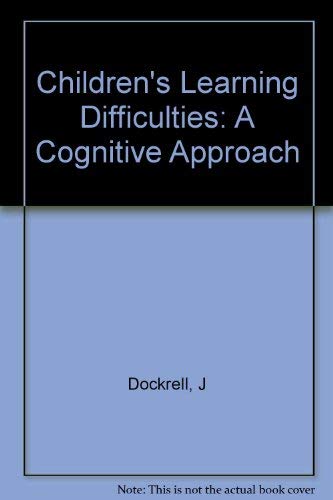Items related to Children′s Learning Difficulties: A Cognitive...

Synopsis
Many children experience learning difficulties which may be specific, such as with language, reading and numbers, or more general, such as "mental handicap". In this book, the authors provide an account of learning difficulties, linking the theoretical with the practical. The central theme of the book is the role that cognitive factors play in these problems: how do children with learning difficulties differ in the way they process information?; and are the differences due to lack of efficiency or a disturbance in the cognitive system? The authors argue that it is only when the child's difficulty is established within a theoretical model of cognitive development that it is possible to develop intervention techniques to help the child in the acquisition of new skills. They go on to describe the skills and strategies children need in order to read, spell, talk and use arithmetic; they show how to assess what missing skills and wrong techniques lie behind learning difficulties, and they discuss the techniques which can be used to correct and compensate for these problems.
"synopsis" may belong to another edition of this title.
Review
"This book is clearly written and considers both specific learning difficulties in language, reading and number as well as more general learning difficulties. One of the book′s strengths is that it is fairly self–contained with essential background information on psychological theory being provided. However, I would also recommend the book to others who want an up–to–date, informed and comprehensive account of learning difficulties experienced by many children either on a temporary or permanent basis." Vicky Lewis, British Journal of Developmental Psychology
From the Back Cover
Many children experience difficulties in learning. These difficulties may be specific, as occurs when a child experiences problems with some particular task such as reading, or they can be more general, as occurs when learning is slower than normal across a range of tasks. In this book Julie Dockrell and John McShane aim to give a clear account of learning difficulties, linking the theoretical with the practical in an accessible framework.
A central theme of the book is the role that cognitive factors play in learning difficulties. What impedes a child′s progress in acquiring new knowledge? Why are children with learning difficulties impoverished in their use of strategies? How do children with learning difficulties differ from children developing without such problems? The authors argue that in order both to assess a child′s problems and to design successful intervention programs it is essential to have an understanding of the demands placed on a child′s cognitive system and the abilities of that system to deal with these demands They go on to describe the skills and strategies children need in order to read, spell, talk and use arithmetic; they show how to assess what missing skills and techniques lie behind learning difficulties, and discuss techniques which can be used to correct and compensate for these problems. Throughout the authors aim to give practitioners a way, based in theory, of evaluating and tackling the problems facing any given child.
"About this title" may belong to another edition of this title.
FREE shipping within United Kingdom
Destination, rates & speedsSearch results for Children′s Learning Difficulties: A Cognitive...
Children's Learning Difficulties : A Cognitive Approach
Seller: Better World Books Ltd, Dunfermline, United Kingdom
Condition: Good. Ships from the UK. Former library book; may include library markings. Used book that is in clean, average condition without any missing pages. Seller Inventory # 700328-20
Quantity: 1 available
Children's Learning Difficulties : A Cognitive Approach
Seller: Better World Books, Mishawaka, IN, U.S.A.
Condition: Good. Former library book; may include library markings. Used book that is in clean, average condition without any missing pages. Seller Inventory # 700328-20
Quantity: 1 available

